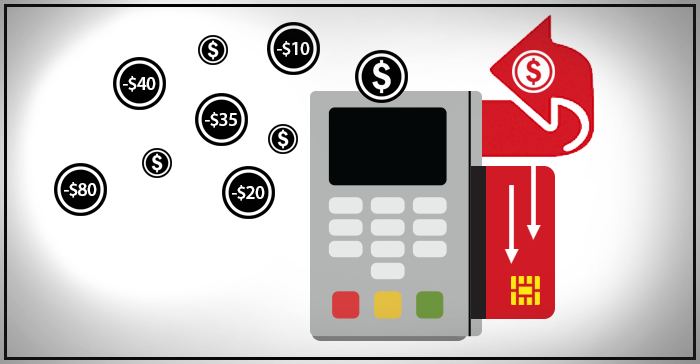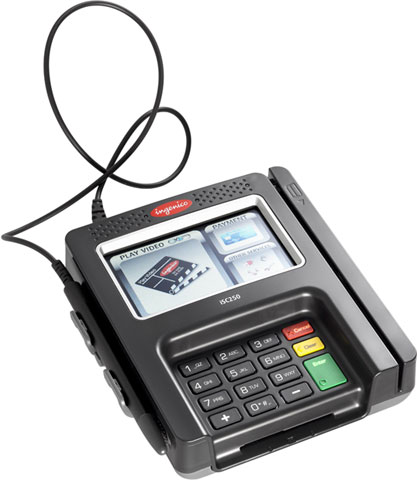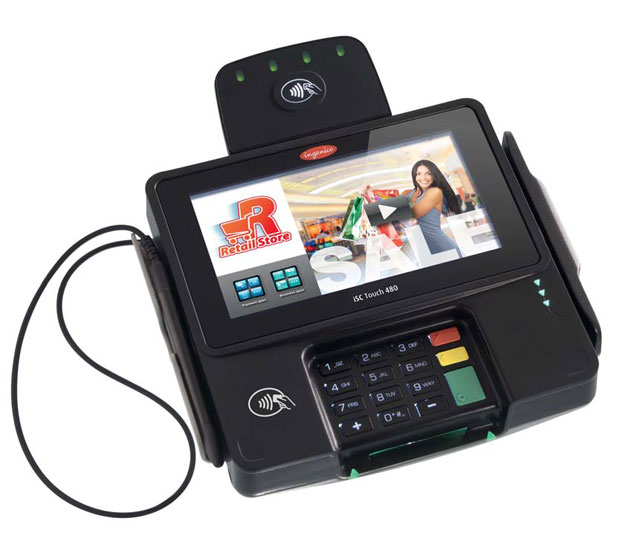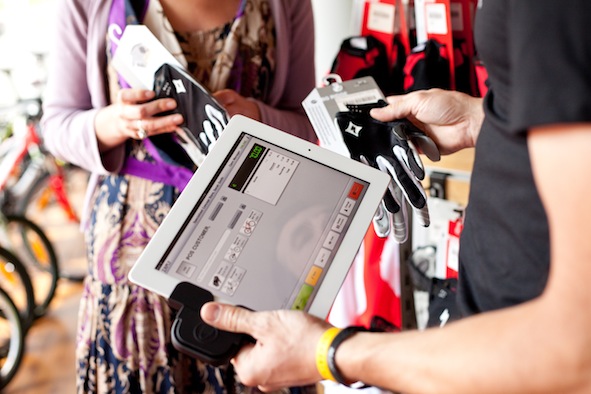ID TECH and Worldnet Achieve EMV Certification Through First Data
 ID TECH and Worldnet combine to provide EMV chip-card acceptance to cloud-based merchants, unattended kiosk manufacturers, retailers, and mobile merchants have received EMV certification through First Data. The certification using the GoChip EMV SDK encompasses all the ID TECH’s products that incorporate the ID TECH Common Kernel.
ID TECH and Worldnet combine to provide EMV chip-card acceptance to cloud-based merchants, unattended kiosk manufacturers, retailers, and mobile merchants have received EMV certification through First Data. The certification using the GoChip EMV SDK encompasses all the ID TECH’s products that incorporate the ID TECH Common Kernel.
GoChip supports traditional POS as well as iOS and Android operating systems for mobile and tablet POS merchants and is available for Windows Desktop, Apple OS, iOS, Android, Windows Mobile 8.1 and Java.
Don’t Let EMV Chargebacks Cut into Your Profits
 With EMV in full swing in the U.S., chargebacks have been on the rise – especially for restaurateurs. Following a successful co-hosted webinar with National Restaurant Association on the basics of chargeback management and best practices last month, we discovered a second installment was in high demand.
With EMV in full swing in the U.S., chargebacks have been on the rise – especially for restaurateurs. Following a successful co-hosted webinar with National Restaurant Association on the basics of chargeback management and best practices last month, we discovered a second installment was in high demand.
The webinar took a deeper dive into the rules of EMV and chargebacks and what you can do to avoid them. If you weren’t able to join us for the presentation, we’ve summarized the high points here to help you better understand chargebacks and the liability shift.
Why EMV, Why Now?
Protecting yourself against counterfeit fraud is one of the main benefits to implement EMV because it’s virtually impossible to recreate the chip. The October 1, 2015 shift has caused some serious headaches, but the ultimate goal is to fix the payment ecosystem by heightening card security. There is, however, a glitch—if your equipment isn’t EMV-compatible, then use of a fraudulent EMV card can go undetected.
3 Reasons to Upgrade to EMV Now
 With the official October 1st EMV compliance date behind us, there are still many retailers that have not made the needed changes to properly process EMV enabled cards. Almost all banks and credit card companies have issued chip-embedded cards to their customers in time for the busy holiday shopping season so it really begs the question what are the real advantages to making the EMV switch.
With the official October 1st EMV compliance date behind us, there are still many retailers that have not made the needed changes to properly process EMV enabled cards. Almost all banks and credit card companies have issued chip-embedded cards to their customers in time for the busy holiday shopping season so it really begs the question what are the real advantages to making the EMV switch.
- Fighting Fraud – Chip cards generate a one-time code with every transaction making it nearly impossible to create counterfeit cards for use in stores.As the EU has completed its migration to EMV acceptance, the region has seen an 80% reduction in credit card fraud while the US has witnessed a 47% increase
- Lower Chargebacks – Beginning October 1, 2015, new network rules mean merchants are more likely to be financially liable for fraud, lost/stolen transactions at their in-store locations without EMV compliance. In 2015 that liability in the United States is estimated to total more than $10 billion.
- Customer Peace of Mind – Customers are more than likely to shop at stores where they feel their information is safe. It only takes once to lose the customers trust and it is very difficult to get it back.
Two of the easiest solutions to become EMV compliant is simply upgrading your current payment terminals to EMV enabled ones like the Ingenico ISC250 and iPP350. Updating is an easy process and one of our Payment Processing specialists can help you find the right device for a hassle free update. Contact us today to get EMV compliant.
Infographic: Point-of-Sale Data Security Pressure Intensifies
Lately we have been hearing more and more cases of retailers having their point-of-sale and payment processing systems being compromised putting their customer’s personal information in the wrong hands. Keeping your POS system secure is critical with today’s common use of online and mobile shopping which have opened up new types of security risks.
This infographic sheds some light the new security challenges retailers are facing today and how there is still a lot of room to improve.
EMV Compliance and Payments Explained
 If your business takes any kind of card payments then you probably have been coming across the term “EMV” quite a bit recently. If you haven’t, then it’s a good time to get educated given EMV will be changing the way payments are made and who will be held accountable for fraud in the US.
If your business takes any kind of card payments then you probably have been coming across the term “EMV” quite a bit recently. If you haven’t, then it’s a good time to get educated given EMV will be changing the way payments are made and who will be held accountable for fraud in the US.
EMV enabled cards are the type that have the small smart chip on them as well as the traditional magnetic stripe. Compared to magnetic stripes, EMV cards are much more secure against fraudulent usage and copied cards.
With the October 1, 2015 EMV compliance deadline coming up, getting up to speed on how you can ensure your business isn’t going to be held accountable for fraudulent usage is a must. Barcodes, Inc has you covered with our new EMV Learning Page and the expertise to provide you will payments solutions for any budget.
Penske Eliminates PCI Compliance Risk with Advanced Payment Devices

Industry: Transportation & Logistics
Application: Payment Processing & Asset Management
Barcodes Inc’s value added services teams deploy, maintain, and service thousands of payment devices for Penske’s nation-wide rental network.
Executive Summary
Penske Truck Rental was looking to eliminate PCI compliance risk within their business and reduce the number of lost or ineffective devices by implementing a revamped hardware and services platform across the 3,300 corporate and agent rental locations. Due to the complexity of the Penske rental network and number of devices deployed, Penske wanted a systematic way to track and manage the devices, as well as deliver repair and spare pool management services. In addition, Penske required a solution provider to develop software which would reduce the need for paper and allow electronic signature capture as well as integrate the terminals with the existing Penske backend systems. Barcodes Inc, through coordination with a software provider, was able to deliver the solution and work with Penske as an ongoing value added partner.
Ingenico and FreedomPay Power the Most Secure Transactions With EMV & NFC Capabilities
Ingenico and FreedomPay have announced their partnership and the certification of the innovative Telium2 series point-of-sale (POS) payment devices. The integration extends to Ingenico’s retail base application (RBA) and its innovative hardware, including iSC250 Signature Capture terminal and iPP350 PIN Pad devices. The newly supported Ingenico RBA software-powered devices will accept magnetic stripe and EMV chip-card payments, as well as NFC-based transactions, enabling tap-and-go mobile payments. Ingenico devices will be integrated and connect to the FreedomPay Commerce Platform, a cloud-based smart technology gateway, that supports true point-to-point encryption (P2PE), instantly reducing merchants’ scope for the Payment Card Industry Data Security Standard (PCI DSS) compliance and giving merchants a path to future payment system expansion.
5 Signs You Need to Upgrade Your POS System

POS systems – or point-of-sale systems – are the hardware and software systems that a business uses to process sales and collect payment from customers. POS systems have evolved greatly since basic register-style units. Modern systems include many additional features that allow you to input orders, manage inventory, track staff attendance, print invoices, and process reports.
If you’ve been in business for some time or are still using an old fashioned cash register – you may want to look at updating your POS and payment processing system. How do you know it’s time for an upgrade? Here are five tell-tale signs: Continue reading »
The Retail Point of Sale Goes Mobile
 Mobile point-of-sale payment terminals have experienced explosive growth over the past year. Unlike a traditional point-of-sale terminal, a mobile terminal communicates wirelessly when processing payment cards. There are different types of solutions in the market, but one popular type is an application within a mobile device, like a smartphone or tablet, that uses a hardware attachment to swipe payment cards.Merchants who use these solutions should remember to comply with both existing and evolving legal and card association requirements, particularly as other new payment acceptance solutions, such as integrated chip (IC) and near field communication (NFC) point-of-sale terminals, are adopted widely.
Mobile point-of-sale payment terminals have experienced explosive growth over the past year. Unlike a traditional point-of-sale terminal, a mobile terminal communicates wirelessly when processing payment cards. There are different types of solutions in the market, but one popular type is an application within a mobile device, like a smartphone or tablet, that uses a hardware attachment to swipe payment cards.Merchants who use these solutions should remember to comply with both existing and evolving legal and card association requirements, particularly as other new payment acceptance solutions, such as integrated chip (IC) and near field communication (NFC) point-of-sale terminals, are adopted widely.





